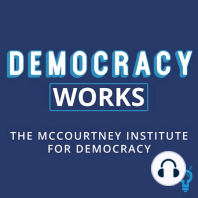35 min listen
A story about democracy, told through 20 million traffic stops
FromDemocracy Works
ratings:
Length:
32 minutes
Released:
Oct 1, 2018
Format:
Podcast episode
Description
The lights flash in your rearview mirror as the police car comes up behind you. A sinking feeling forms in the pit of your stomach as the officer approaches. Sound familiar? However, this is where the story can differ greatly depending on who you are and where you live. If you’re African-American or Latino, you are much more likely to be searched or have your vehicle searched — and much more likely to be pulled over in the first place, according to research conducted by analyzing data from millions traffic stops in North Carolina over more than a decade.
Frank Baumgartner, Robert J. Richardson Distinguished Professor of Political Science at the University of North Carolina-Chapel Hill, lead the team that analyzed the data published the book Suspect Citizens: What 20 Million Traffic Stops Tell Us About Policing and Race.” In the book, Frank and his colleagues make the case that an empathy gap exists between people with political and social power and the people who are most likely to be pulled over. The result is that segments of the population who are already disenfranchised become even more distrustful of the police and the government and less likely to vote and otherwise engage with democracy.
We’ve long heard that racially-motivated police violence is the result of a few “bad apple” officers. However, the data from North Carolina show a much more pervasive suspicion from police officers about young men of color. Combined with a move toward what Frank describes as “risk management” policing, the result is a clear pattern of behavior that has direct implications on democratic participation.
P.S. A huge thank you to everyone who supported us in the 2018 Podcast Awards. We are incredibly humbled and grateful to have won during our first year.
More Information
Suspect Citizens: What 20 Million Traffic Stops Tell Us About Policing and Race
Frank’s profile on the Scholars Strategy Network
Discussion/Reflection Questions
Do you believe that there is racial bias in policing in America?
Based on your own experience with law enforcement, do you trust the police?
Do your interactions with law enforcement impact your view of the government and your willingness to engage in democracy?
Do you think the aim of police should be to solve crime or try to prevent crime?
Do you think policing in America is getting better? Why or why not?
Interview Highlights
[3:41] How did you come about the data for this book?
Frank: An investigative reporter in North Carolina conducted an investigation into possible racial profiling in the police department in 1996. This was also a time when people were becoming growingly concerned with racial profiling by police. At this time, North Carolina became the first state to mandate the recording of data about traffic stops, including the race of the individual stopped. I was then invited to look at the information they had collected in the early 2000s as part of a task force.
[5:25] Can you walk us through how a traffic stop experience might differ along racial lines?
Frank: As a middle class white man myself, I have very few interactions with the police. But when I do, it is always very respectful and by the book. It is extremely rare for someone in this demographic to get pulled over by the police. For someone of color, it would be frustratingly common. These traffic stops usually lead to no citation or ticket. However, such stops are more likely to extend into a search of the vehicle.
[6:54] What did you find to be the cause of this variance in frequency and nature of stops?
Frank: We think party of the problem is that police officers are usually dealing with a low information situation when making a stop. Too often, they rely on visual cues to evaluate whether someone is a threat or not. And under the law, which has been confirmed mostly by middle class white men, it assumes that these stops will only be temporary inconveniences. However, as the data showed, these stops are not that uncommon. There is also a
Released:
Oct 1, 2018
Format:
Podcast episode
Titles in the series (100)
Middle America, Part 2: Grassroots organizing and rebooting democracy: Last week, we heard from Salena Zito about the segments of middle America who supported Donald Trump after voting for Barack Obama. This week, we talk with another Pittsburgh resident, Lara Putnam, about a different version of Middle America — the college-educated, middle-aged suburban women who have dusted off the organizing skills honed through decades … Continue reading Middle America, Part 2: Grassroots organizing and rebooting democracy → by Democracy Works
